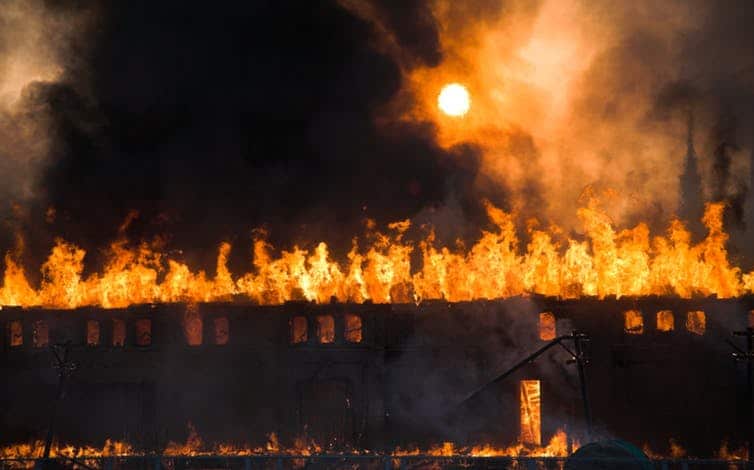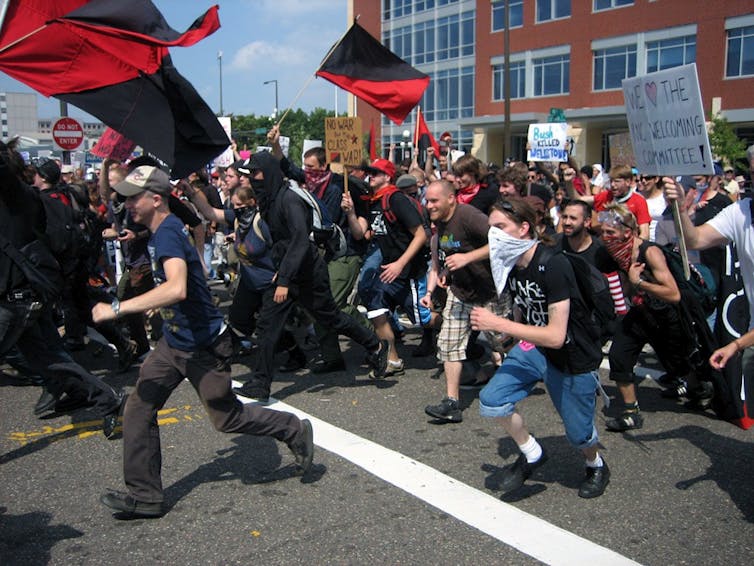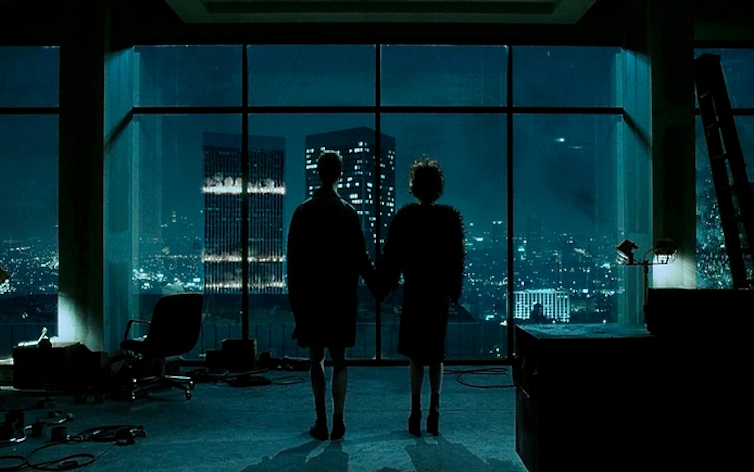Defining “radicalism” to better combat it
The concept of "political radicalism" is multifaceted and open to multiple interpretations. In public debate, the term " radical" is generally applied to movements or ideas to emphasize their distance from the accepted norm, with the possible intention of relegating them to the margins of the political system.
Nicolas Lebourg, University of Montpellier
This is how we see the terms appear. radicalization, radical, radicalism, ultra, extreme sometimes used indiscriminately in the media or by politicians.
However, the legal rules governing partisan organizations can serve as a basis for establishing an operational and objective definition of the concept of political radicalism. To better understand what we mean when we use this expression, we propose to use French law as a guiding principle, on the understanding that it can be extrapolated to other political and legal contexts and therefore other cultural areas—bearing in mind that the very meaning of the words extremism and radicalism vary greatly depending on the context.
French executive
Under French law, political parties are non-profit associations governed by the law of July 1, 1901, and their constitutional role is recognized under theFifth Republic byArticle 4 of the Constitution.
Several restrictions are thus placed on the very existence of a party. The law of 1901 stipulates that associations may not have "the aim of undermining the integrity of the national territory and the republican form of government." The judiciary has the power to dissolve any association that does not comply with these criteria. The Constitution specifies that
“Political parties and groups contribute to the expression of suffrage. They are formed and operate freely. They must respect the principles of national sovereignty and democracy.”
However, political parties, like associations that are legally or de facto inactive in electoral matters, are still subject to the law of January 10, 1936 (now Article L.212-1 of the Internal Security Code).
The legislative text of January 10, 1936 specified that:
“All associations or de facto groups shall be dissolved by decree issued by the President of the Republic in the Council of Ministers: (1) Which incite armed demonstrations in the streets; (2) Or which, apart from military training societies approved by the Government and physical education and sports societies, by their military form and organization, resemble combat groups or private militias; (3) Or which have the aim of undermining the integrity of the national territory or using force to attack the republican form of government."
Known for having been taken against far-right leagues, this law was therefore not aimed at regulating the electoral process but rather the entire field of political activism.
The ordinance of December 30, 1944 amended the law of January 10, 1936, allowing groups that hindered the process of restoring democracy after the war to be targeted, and the supplementary law of January 5, 1951 went further by adding to the list of groups that could be targeted those
"whose purpose would be either to bring together individuals who have been convicted of collaborating with the enemy or to glorify such collaboration."
Laws created after World War II
These laws were enacted in a democratic context that had been traumatized and weakened by World War II. The development of international institutions aimed at protecting and maintaining peace reinforced this type of measure.
Thus, the law of July 1, 1972, known as the "Pleven Law," extending the 1965 United Nations International Convention, brought associations that
“incite discrimination, hatred, or violence against a person or group of persons on the basis of their origin or their membership or non-membership in a particular ethnic group, nation, race, or religion, or propagate ideas or theories that tend to justify or encourage such discrimination, hatred, or violence.”
The law of January 10, 1936, finally underwent a series of adjustments beginning in the late 1980s. In particular, the law of September 9, 1986, following a series of attacks on the country, added groups that "engage, on French territory or from French territory, in activities with a view to provoking acts of terrorism in France or abroad."
The provisions of the law of January 10, 1936 were finally incorporated into the Internal Security Code (L. 212-1) in 2012. Under the state of emergency, the law of November 21, 2015 added the possibility of dissolving:
“by decree of the Council of Ministers, associations or de facto groups that participate in acts seriously undermining public order or whose activities facilitate or encourage such acts.”
As early as spring 2016, the provision was applied to the association that managed the "radical" mosque in Lagny-sur-Marne (Seine-et-Marne).
Based on the current state of the law, it is therefore possible to identify several characteristics of "political radicalism": undermining the republican form of government, undermining the integrity of the territory, links with collaboration or any attempt to rehabilitate it, incitement to hatred, discrimination or violence.
Ideological radicalism is very often accompanied by the use of militant violence, in forms that are also listed by law: armed demonstrations, paramilitary practices, terrorism, and serious breaches of public order.
The "republican form of government," according to the wording of French law, must therefore be understood as the representative and pluralistic democratic form of institutions.
What the situation across the Rhine tells us
These elements thus provide some basis for understanding what radicalism is and possibly extending it to the international level.
German law offers other perspectives here—noting that the concept of extremism in Germany refers to the desire to attack the representative democratic system.
In this context, "radicalism" corresponds to criticism of liberalism within the democratic sphere.
German political parties are integrated into the Basic Law, the German Constitution, since May 8, 1949 (Article 21) and the case law of the Federal Court in Karlsruhe, the German constitutional court, which ensures respect for fundamental rights. The Court has been called upon to clarify the role of political parties in Germany, both in terms of their constitutionality and their financing.

Jake Mohan/Wikipedia, CC BY-SA
From a legal standpoint, German political parties are special associations whose purpose is to "protect the fundamental liberal and democratic order."
Beyond this article, parties are subject to the law of July 24, 1967. The 1967 law addresses the Court's concerns and ensures that parties comply with Article 21, in particular paragraph 2: "Parties which, according to their aims or the attitude of their members, seek to undermine the free and democratic basic order, to overthrow it or to compromise the existence of the Federal Republic of Germany are unconstitutional. The Federal Constitutional Court shall rule on the question of unconstitutionality." It is up to the Court to clarify, through its case law, what is meant by “free and democratic basic order.” In 2017, it rejected a request to dissolve the National Democratic Party of Germany (NPD) on the grounds that its capacity for action did not allow it to undermine the constitutional order.
The right to democratic expression
These debates are also taking place at the European level;
Thus, the case law of the European Court of Human Rights (ECHR), essentially formulated on the basis ofArticle 11 of the European Convention on Human Rights, has also provided a framework for the articulation between pluralistic expression and the maintenance of democratic values and institutions.
The general principle is the right to democratic expression, i.e., while political groups must be able to propose constitutional amendments, these demands cannot be made through violence and cannot target fundamental democratic principles.

Vladimir Morozov/akxmedia/Flickr, CC BY-SA
This definition differs significantly from that of French legislation, since, for example, the dissolution of movements seeking to undermine the current integrity of a territory is considered by the Court to be a violation of Article 11, unless the claim is expressed through violent means.
These legal elements target established movements—Article 11 covers the issue of freedom of association, and the ECHR has decided to include political organizations within this framework.
The ECHR also recognizes the right of states to combat violent demonstrations or those inciting hatred at the instigation of "civil society organizations" that do not fall within the category of political parties.

Wallalphacoders.com
The advent of rigid thinking
Indeed, the concept of radicalism cannot be limited to legal political groups, because "radicalism" has to do with the processes of "radicalization."
Radicalization can therefore be defined as the gradual and evolving adoption of a rigid, absolute and non-negotiable belief system, the logic of which structures the worldview of those who adhere to it. They use violent means of action, most often within clandestine, formalized or virtual structures, to make their views heard, isolating themselves from ordinary social references and projecting a grandiose image of themselves. formalized or virtual, which isolate them from ordinary social references and project a grandiose image of themselves.
Three elements thus form the basis of the approach to radicalization: its evolutionary dimension, the adoption of sectarian thinking, and the potential use of armed violence.
Radicals therefore generally aim to change liberal institutions and the egalitarian humanist values on which they are built, or even to bring about a more or less extensive social rearrangement in order to eliminate an "enemy" who is ideologically and symbolically constructed as a major figure in a world often imagined as Manichean.
![]() This text was co-signed by Cécile Alduy, Professor, Stanford University, Associate Researcher, Cevipof, Sciences Po; Jean-Yves Camus, Director of the Observatory of Political Radicalism at the Jean Jaurès Foundation and Associate Researcher at IRIS; Sylvain Crépon, University of Tours, Laboratory for the Study and Research Public Action (LERAP); Xavier Crettiez, University Professor, agrégé in political science, Center for Sociological Research on Law and Penal Institutions (Cesdip), Sciences Po Saint-Germain-en-Laye; Romain Ducoulombier, historian, Delphine Espagno, MCF, Sciences Po Toulouse, Laboratory of Social Sciences of Politics (LaSSP); Stéphane François, associate researcher at the Societies, Religions, Secularism Group (GSRL); Joël Gombin, associate researcher at the Belief, History, Space, Political and Administrative Regulation Group (CHERPA), Sciences Po Aix; Guillaume Origoni, doctoral student in contemporary history at Paris Nanterre University within the Multilingual Multidisciplinary Research Center (CRPM); Dominique Sistach, MCF, University of Perpignan Via Domitia, CDED/CERTAP.
This text was co-signed by Cécile Alduy, Professor, Stanford University, Associate Researcher, Cevipof, Sciences Po; Jean-Yves Camus, Director of the Observatory of Political Radicalism at the Jean Jaurès Foundation and Associate Researcher at IRIS; Sylvain Crépon, University of Tours, Laboratory for the Study and Research Public Action (LERAP); Xavier Crettiez, University Professor, agrégé in political science, Center for Sociological Research on Law and Penal Institutions (Cesdip), Sciences Po Saint-Germain-en-Laye; Romain Ducoulombier, historian, Delphine Espagno, MCF, Sciences Po Toulouse, Laboratory of Social Sciences of Politics (LaSSP); Stéphane François, associate researcher at the Societies, Religions, Secularism Group (GSRL); Joël Gombin, associate researcher at the Belief, History, Space, Political and Administrative Regulation Group (CHERPA), Sciences Po Aix; Guillaume Origoni, doctoral student in contemporary history at Paris Nanterre University within the Multilingual Multidisciplinary Research Center (CRPM); Dominique Sistach, MCF, University of Perpignan Via Domitia, CDED/CERTAP.
Nicolas Lebourg, Associate Researcher at CEPEL (Center for Political Studies of Latin Europe), University of Montpellier
The original version of this article was published on The Conversation.